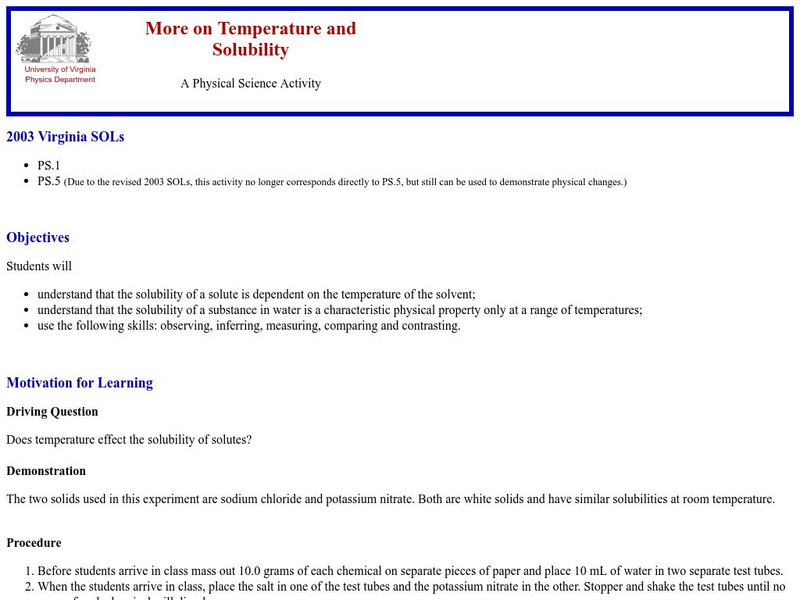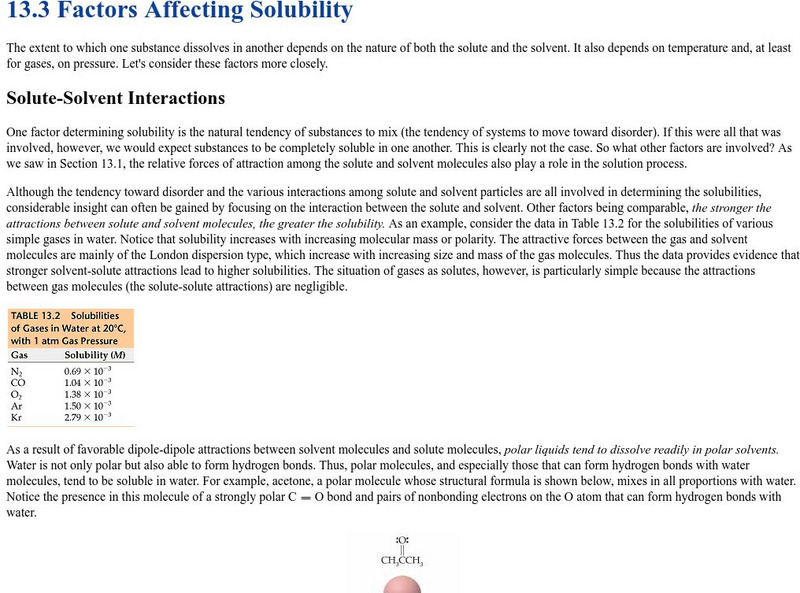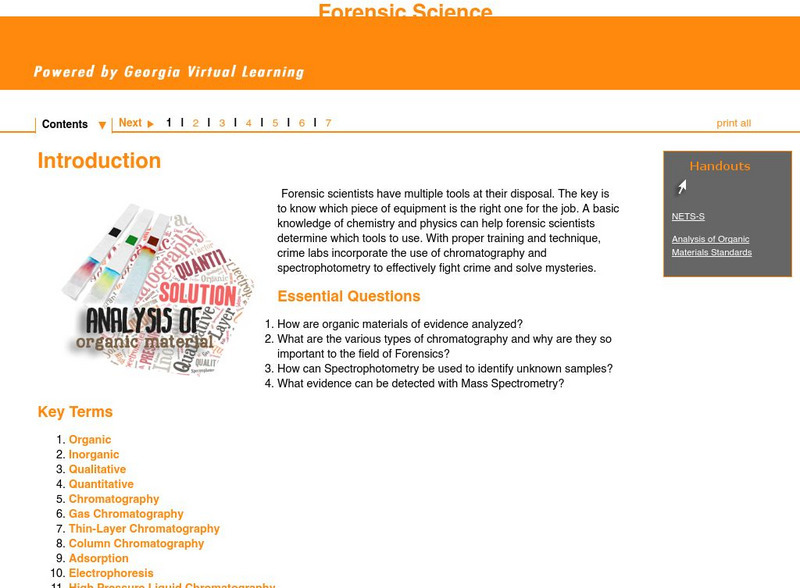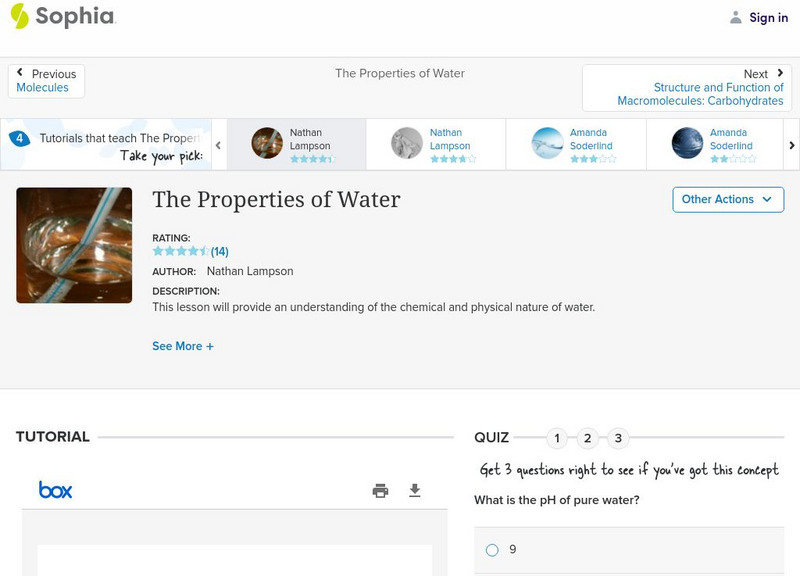Frostburg State University
Why Does the Solubility of Gases Usually Increase as Temperature Goes Down?
This chemistry course article, "Why does the solubility of gases usually increase as temperature goes down?," provides text and related links on the effects of temperature and pressure on the solubility of gases.
Other
What Is Life: Aqueous Solutions
Discussion of water as a solvent. Includes material on hydrogen bonds, hydration, hydrophobic effect, acids, basses, and pH.
Concord Consortium
Concord Consortium: Stem Resources: Solubility
Learners can use this web-based activity to study solutions, as far as the intermolecular attractive forces that allow or do not allow a solvent to dissolve in a solute. Also discussed includes the solubility rule "like dissolves like"...
Mocomi & Anibrain Digital Technologies
Mocomi: Difference Between Solution Solute and Solvent
Article offers a comparison between a solution, a solute, and a solution and provides examples.
University of Virginia
University of Virginia: More on Temperature and Solubility
Lab set up to compare the effect of temperature on the solubility of two solutes (NaCl and KNO3).
Savvas Learning
Pearson Education: Factors Affecting Solubility
Learn how the extent to which one substance dissolves in another depends on the nature of both the solute and the solvent.
Science Education Resource Center at Carleton College
Serc: Investigating Chromatography: Selecting Variables
For this lab, students will demonstrate observation skills as they design an experiment to separate colors of various water-based pens in order to learn about mixtures and solutions. Students will determine a variable to test and...
Science Education Resource Center at Carleton College
Serc: Mn Step: Solutions: Solubility and Miscibility
For this activity, learners will test the solubility and miscibility of various substances in water, and explain the chemistry involved. They will also be given a solid and a liquid and asked to predict what will happen when each is...
CK-12 Foundation
Ck 12: Plix: Solute and Solvent
[Free Registration/Login Required] While paying attention to the charges, move the salt ions and water molecules around to simulate how salt ions are dissolved in water.
Carnegie Mellon University
Chem Collective: Brownian Motion
Particulate level simulations that show only solute particles are convenient, since they focus student attention on the molecules of most interest. However, such solute molecules move in a Brownian manner. This simulation helps students...
American Chemical Society
Middle School Chemistry: Lesson Plans: Does Temperature Affect Dissolving?
Students identify and control variables to design an experiment to see whether the temperature of a solvent affects the speed at which a solute dissolves.
Concord Consortium
Concord Consortium: Molecular Workbench: Water and Polar Substances
Adjust amounts of ionic charges in this simulation to see how water molecules react to polar substances in solution.
Georgia Department of Education
Ga Virtual Learning: Analysis of Organic Materials Analysis of Organic Materialsv
This comprehensive interactive tutorial continues to explore the forensic science field. Learn how organic materials of evidence are analyzed and what the various types of chromatography are, especially why they are so important to this...
Annenberg Foundation
Annenberg Learner: Virtual Particle Lab: Dissolving
Explore what happens when one substance dissolves into another. Run the simulations and see if you can predict the results.
Other
Aqueous
A chemical tutorial describes the term "aqueous" and features examples of how different substances dissolve.
CK-12 Foundation
Ck 12: Chemistry: Dissolving Process
[Free Registration/Login may be required to access all resource tools.] Describes solution formation and interaction of solute with water.
Other
Science House: Ice Cream
Experiment shows students how to use the lowered freezing point of water to chill another mixture (ice cream) to the solid state. Teacher's notes provide background information.
Science Education Resource Center at Carleton College
Serc: Mn Step: Spotting Chromatography
A lab activity that introduces chromatography using markers, plus water and acetone as the solvents. Learners will take measurements to compare the mobile and stationary phases of the inks, and find the polarity of the inks and solvents....
Sophia Learning
Sophia: Suspensions: Lesson 2
This lesson will explain the properties of a suspension, and describe why it is unique from other mixtures. It is 2 of 2 in the series titled "Suspensions."
Sophia Learning
Sophia: The Properties of Water: Lesson 4
This lesson will provide an understanding of the chemical and physical nature of water. It is 4 of 4 in the series titled "The Properties of Water."
Sophia Learning
Sophia: The Properties of Water: Lesson 1
This lesson will provide an understanding of the chemical and physical nature of water. It is 1 of 4 in the series titled "The Properties of Water."
Other
How to smile.org: Solubility Test
Students can figure out what an unknown crystal is by comparing their dissolving test with the known and unknown crystals. This inquiry activity includes background information and student handout.
Sophia Learning
Sophia: The Properties of Water: Lesson 3
This lesson will provide an understanding of the chemical and physical nature of water. It is 3 of 4 in the series titled "The Properties of Water."
Other popular searches
- Solution, Solvent, Solute
- Solution Solvent Solute
- Solute Solvent Solution Lab
- Solute Solvent and Solution























